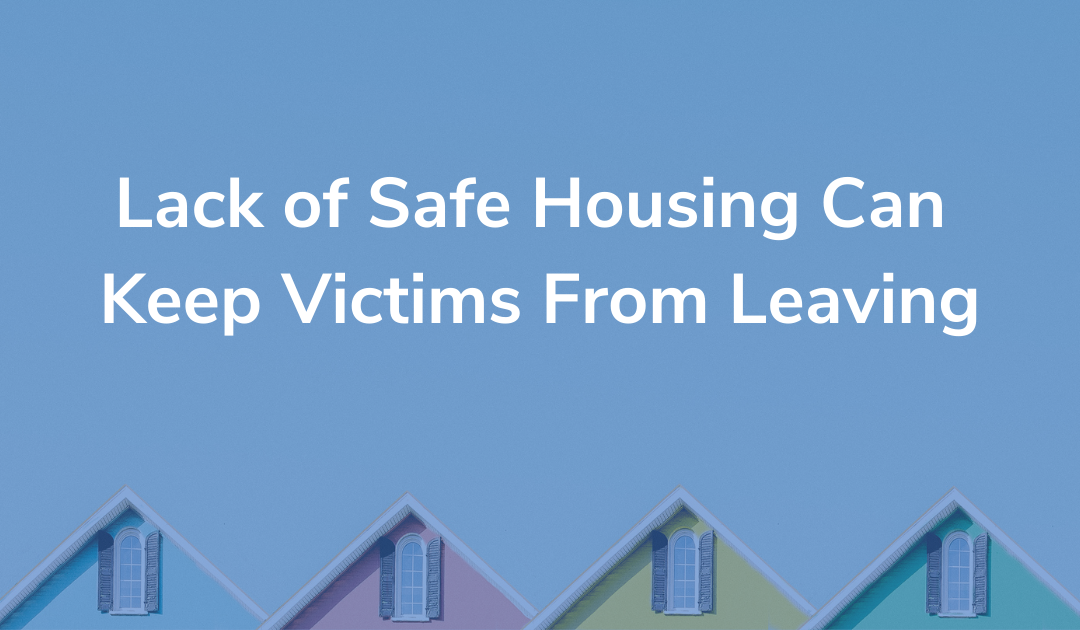Lack of Safe Housing Can Keep Victims from Leaving
What is Affordable Housing?
When you think about affordable housing, what comes to mind? An apartment? A rental? A small house in a suburban neighborhood? By definition, housing becomes unaffordable when a family begins paying over 30% of their wages for housing. For low income individuals and families, affordable housing is much harder to find. As construction costs and population numbers grow, but low-level wages continue to lie stagnant, the percentage of those struggling to afford housing is increasing.
Each year, the National Low Income Housing Coalition publishes a report showing the “housing wage” that a person would need to earn full time (40 hours a week, 52 weeks a year) in order for a two-bedroom rental unit to be affordable by the official government standard. In 2019, the report found that the hourly wage a full-time worker must earn to afford a rental home at HUD’s fair market rent without spending more than 30% of his or her income on housing is $22.96 (wage per hour) for a modest two-bedroom rental home and $18.65 for a one-bedroom rental home.
The Correlation Between Homelessness and Domestic Violence
Domestic violence is a leading cause of homelessness for women. More than 90 percent of homeless women experience severe physical or sexual abuse at some point in their lives. The act of leaving an abusive relationship can be the hardest bridge to cross. Survivors are at highest risk of homicide when leaving/attempting to leave, and they often must flee their homes at a moment’s notice to escape life-threatening violence.
Even once leaving, finding immediate safety isn’t the only hurdle survivors must overcome. Creating a long-term, sustainable and affordable housing plan is a serious barrier that survivors of abuse are facing today. A lack of alternative, safe housing options often leads to victims returning to their abuser. Many survivors often feel that they must choose between homelessness and enduring abuse.
Barriers to Finding Long-Term Housing
Often, survivors must leave the relationship without access to finances and other resources needed to secure permanent housing, such as social security cards or birth certificates. Personal affects must be replaced, often Personal Protection Orders are needed, emergency custody orders must be filed – all of these are very real, immediate safety measures that survivors must face before creating a stable housing plan.
Financial abuse occurs in 99% of abusive relationships. Abusers often leave their partner in financial ruin, destroying their credit by putting utilities, mortgages, and credit cards in the victim’s name and refusing to pay. By destroying their partner financially, an abuser limits a survivor’s ability to find a landlord that will rent to them. Survivors may also have previous evictions as a result of the abuse, making it more likely that landlords will discriminate against the survivors, noting past violence in the home. Affordable housing barriers can also be harder to overcome for those marginalized groups of our society, such as people of color, survivors with disabilities, formerly incarcerated individuals, and more.
2020 has also brought with it a new barrier: the novel coronavirus (COVID-19). Major shut-downs have diminished access to resources and the ability to find housing. Fear of contracting COVID-19 in a shared public living space may cause a survivor to remain in an unsafe situation. In this new virtual world, survivors do not have the same access to previous support systems, such as churches, school, or work. Many survivors are finding it harder to reach out for support, given the increase in time sent at home with their abuser.
Nationally, the average stay at an emergency homeless shelter is 60 days, while the average length of time it takes a homeless family to secure housing is 6-10 months. Barriers unique to each survivor can make this timeline much longer. Without a safe and stable home, people are much more vulnerable to trauma and abuse.
At Resilience, we are determined to help survivors overcome these barriers by providing support, resources, and advocacy. We are actively working on creating sustainable housing options with survivors, and together, we will ensure that housing in never a barrier to leaving abuse.
We encourage you to keep an eye out for a future blog on how our Supportive Housing programs are creating safer futures for survivors and their children. You can help us provide crucial financial assistance to survivors that are facing homelessness due to domestic violence by clicking here.
Learn more about our Safe Nights Campaign here: https://resiliencemi.org/safe-nights/
For free and confidential support, contact us any time:
24-Hour Help Line: 1-800-848-5991
Hablamos Español: 1-866-728-2131
Safe E-mail: GinnyP411@gmail.com
Sources:
https://nnedv.org/spotlight_on/impact-safe-housing-survivors/
